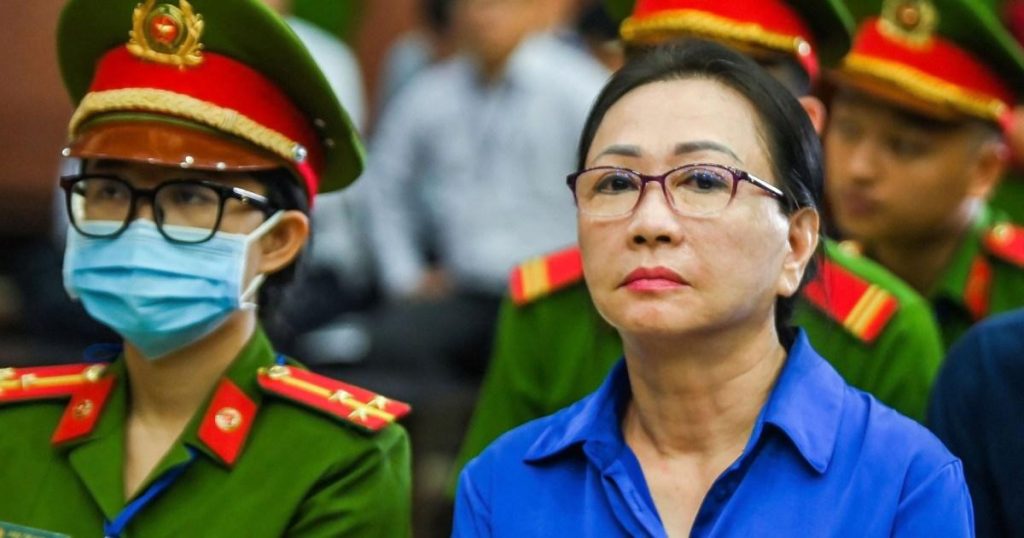A prominent property tycoon in Vietnam, Truong My Lan, is facing a massive financial fraud case, with over £7 billion at stake. Lan, the chair of real estate developer Van Thinh Phat Holdings Group, has been found guilty of embezzlement, bribery, and violations of banking rules following a trial in April. She had secretly controlled Saigon Commercial Bank, one of Vietnam’s largest lenders, using a network of shell companies to take out loans and cash totaling £34.5 billion, with £21 billion misappropriated and the rest believed to have been embezzled. If Lan is able to return at least three-quarters of the embezzled money, her sentence could potentially be changed to life imprisonment.
Despite Lan’s appeal against the conviction being rejected, she still has the option to request a review under Vietnam’s legal procedures. Prosecutors emphasized the unprecedented impact of Lan’s crimes on the country, stating that the amount of money embezzled was exceptionally large and unrecoverable, affecting various aspects of society, the financial market, and the economy. Lan has become one of the few women in Vietnam sentenced to death for a white-collar crime. Her lawyer mentioned mitigating circumstances, such as admitting guilt, showing remorse, and paying back part of the embezzled money, but this was deemed insufficient to overturn the verdict.
Lan’s arrest in 2022 led to a crisis at Saigon Joint Stock Commercial Bank (SCB), one of Vietnam’s largest private banks, where a run on deposits occurred due to Lan’s involvement in the fraud. The court upheld the tycoon’s death sentence and sentenced her to life imprisonment at a separate trial in October for charges including obtaining property by fraud, money laundering, and illegal cross-border money transfers. Despite the severity of the sentence, Lan’s lawyer can still request a review under Vietnam’s legal system. The case has generated significant attention in Vietnam and highlights the serious consequences of financial fraud and corruption in the country’s business sector.
The prosecution in Lan’s case emphasized the scale of her crimes and the unprecedented impact they had on Vietnamese society, the financial market, and the economy. Lan’s actions led to a run on deposits at a major private bank in Vietnam, showing the far-reaching consequences of financial fraud in the country. Despite Lan’s attempts to mitigate her sentence by admitting guilt, showing remorse, and making partial repayment of the embezzled funds, the court upheld her death sentence, making her one of the few women in Vietnam sentenced to death for a white-collar crime. The case underscores the importance of accountability and transparency in the business sector to prevent such large-scale fraud cases from recurring.
The legal proceedings against Lan have been closely followed in Vietnam, with the tycoon facing serious charges of embezzlement, bribery, and violations of banking rules. Lan’s control of a major Vietnamese lender enabled her to carry out a complex network of financial fraud, leading to a total embezzlement and misappropriation of billions of pounds. The court’s decision to uphold Lan’s death sentence reflects the severity of her crimes and the need for accountability in cases of white-collar crime. Despite the possibility of a review under Vietnam’s legal system, the consequences of Lan’s actions highlight the importance of ethical business practices and financial transparency in the country’s financial sector.
The case involving Truong My Lan has shed light on the prevalence of financial fraud and corruption in Vietnam’s business sector, with Lan found guilty of embezzlement, bribery, and other charges totaling billions of pounds. The court’s decision to uphold Lan’s death sentence underscores the gravity of her crimes and the need for accountability in cases of white-collar crime. Lan’s attempts to mitigate her sentence by admitting guilt and showing remorse have been deemed insufficient by prosecutors, emphasizing the importance of transparency and ethical behavior in the business sector. The case serves as a cautionary tale about the consequences of financial fraud and corruption in Vietnam and the need for strict enforcement of legal regulations to prevent such crimes in the future.











